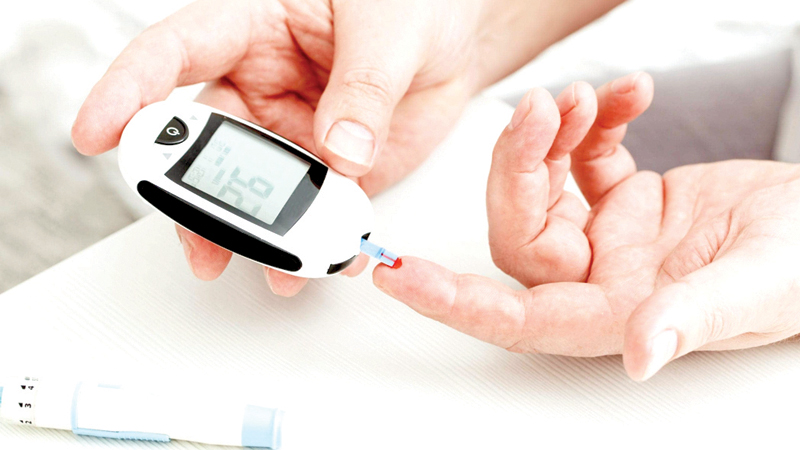 In two days, when diabeticians across the world will observe yet another World Diabetes Day on November 14, the focus of their collective attention will be on Empowering Global Health.
In two days, when diabeticians across the world will observe yet another World Diabetes Day on November 14, the focus of their collective attention will be on Empowering Global Health.
The Sunday Observer spoke to the former Deputy Medical director of the National Diabetes Centre (NDC) of the diabetes Association of Sri Lanka (DASL) and currently Medical Coordinator of Suwadiviya Organisation, Dr. Chamari Pandithage on why diabetes has seen a sharp rise across the world including Sri Lanka in recent years, and how these figures can be slashed to the minimum with some simple easy- to- follow exercises and healthy diets at an affordable price to suit any low budget purse.
Excerpts.

Dr. Chamari Pandithage
Q. World Diabetes Day will see diabetologists across the world focusing their attention on Empowering Global Health which has been selected as the theme for this year. How is global health linked to Diabetes?
A. One in 10 adults worldwide has diabetes. Over 90 percent have type 2 diabetes. Close to half are not yet diagnosed. Knowing your risk and what to do is important to reducing this global health problem.
Q. Diabetes is sometimes called a ‘silent disease” which stalks its victims without any warning and gives no prior warning. Do you agree?
A. Yes. Because in many cases, people do not know that they have diabetes since it can take a long time before symptoms appear.
Q. It is also referred to as a multi-system disease and the “Mother of all disease”. Why?
A. Complications caused by diabetes are very diverse, ranging from large blood vessel disorders (macro vascular) such as in the heart and brain, small blood vessels (micro vascular) such as in the eyes and kidneys, the risk of infection (including tuberculosis and Covid-19), to the risk of cancer.
Q. If uncontrolled, can Diabetes cause damage to the entire body? How?
A. Over time, high blood glucose levels can damage the body’s organs. Possible long-term effects include damage to large and small blood vessels, which can lead to heart attack, stroke, and problems with the kidneys, eyes, gums, feet and nerves.
Q. Who are most at risk of developing these complications age wise?
A. As you get older, your risk of complications from type 2 diabetes increases. For example, older adults with diabetes have a higher risk of heart attack and stroke. Older adults are also more likely to develop other complications of type 2 diabetes, such as nerve damage, vision loss, and kidney damage.
Q. According to health officials while diabetes was previously considered a disease of the elderly (over 65 years), they are now seeing younger persons even in their early forties being admitted with symptoms. What has caused this disturbing trend?
A. Yes as you correctly mentioned, in the past, type 2 diabetes was most often seen in older adults. Now, it’s becoming increasingly common in teens and children due to dietary factors, rates of obesity, and low levels of physical activity.
Q. I understand that an increasing number of pregnant mothers in Sri Lanka are now being admitted to hospitals with gestational diabetes. What has caused this? Obesity? Poor diets?
A. There are several risk factors for developing gestational diabetes. They include overweight or obesity, family history of diabetes, previous gestational diabetes, age, sedentary lifestyle, previous pre diabetes etc.
Q. I’m told that the complications from diabetes also cause nerve dysfunction resulting in the loss of sensation in the feet and the risk of amputation of the leg due to injuries the patient gets without his knowledge. Any truth to this?
 A. This is true. Neuropathy is one of the long-term complications of diabetes. Over time, high blood glucose (sugar) levels can damage the blood vessels that supply the nerves in your body. This stops essential nutrients reaching the nerves.
A. This is true. Neuropathy is one of the long-term complications of diabetes. Over time, high blood glucose (sugar) levels can damage the blood vessels that supply the nerves in your body. This stops essential nutrients reaching the nerves.
As a result, the nerve fibres can become damaged, and they may disappear.
Q. We have a significant proportion of males with diabetes in Sri Lanka. What are the specific problems arising from diabetes with regard to male diabetics? Studies have also said that it can cause erectile dysfunction in males with diabetes. Do you agree?
A. Men with diabetes are 3 times more likely to have trouble getting or keeping an erection. There can be several reasons for this, such as limited blood flow, nerve damage (neuropathy) and damaged blood vessels.
Q. Are there different stages in the progression of Diabetes? If so, what are they?
A. Diabetes occurs in four stages: Insulin resistance, prediabetes, type 2 diabetes, and type 2 diabetes with vascular complications. You are at higher risk for these conditions if you are older than 40, have close biological relatives with diabetes, are physically inactive, or have extra weight.
Q. How is diabetes diagnosed? What are the tests?
A. Your doctor can diagnose diabetes, prediabetes, and gestational diabetes using blood and urine tests.
These tests show if your blood glucose level, also called blood sugar, is higher than the range that is healthy for you. Blood tests can also help identify the type of diabetes you have.
Q. At what time/s should they be carried out? For a fasting blood sugar test how long does one need to fast prior to the test?
A. For a fasting blood glucose test, you can’t eat anything for 8 to 12 hours before the test. You should drink only water. Drinking water before your blood test may make it easier to take your blood.
Q. What is the HbAIc Report?
A. It is a simple blood test that measures your average blood sugar levels over the past 3 months. It’s one of the commonly used tests to diagnose prediabetes and diabetes.
Q. Do all these tests require a hospital setting?
A. Not necessarily. Some blood sugar testing can be obtained at home using a glucometer.
Q. How often do these tests have to be done i) if you are non-diabetic ii) if you already have diabetes?
A. According to the American Diabetes Association, all patients should be screened for diabetes at three-year intervals beginning at age 45, especially people who are overweight or obese. If multiple risk factors are present, screening should be done at an earlier age and more frequently.
If you have diabetes then you must test yourself at least every 3 months or as advised by your Physician.
Q. Is diabetes curable?
A. There’s no cure yet, but we’re awaiting a ground-breaking weight management study, to help people put their type 2 diabetes into remission. Remission is when blood glucose levels are in a normal range again. This doesn’t mean diabetes has gone for good.
Q. Is it reversible? How?
A. The short answer is yes. It’s possible for Type 2 diabetes to go into remission.
To be in remission, your blood sugar levels must remain normal for at least three months without using glucose-lowering medications. Type 2 diabetes is a chronic disease so we don’t say it’s ‘reversed’ or ‘cured’.
Q. Is it manageable? How?
A. Diabetes is serious, but you can learn to manage it. People with diabetes need to make healthy food choices, stay at a healthy weight, move more every day, and take their medicine.
Q. Exclusive breastfeeding for the first six months of a baby’s life has been recommended by the WHO and UNICEF. Can breastfeeding help prevent early diabetes? In what way?
A. Breastfeeding for six months or longer cuts the risk of developing type 2 diabetes nearly in half for women throughout their childbearing years. Breastfeeding increases insulin sensitivity and improves glucose metabolism in the mother.
Q. How do we prevent diabetes risks? Has the Health Ministry published any guidelines on the Do’s and Don’ts with regard to Diabetes?
A. Yes they have. Progressing from prediabetes to diabetes isn’t inevitable. Although you can’t change certain factors like your genes or age, several lifestyle and dietary modifications may reduce your risk.
Do try and reduce your weight, exercise more, lower your carb intake, add in more fibre to your diet, make water your primary beverage, quit smoking and alcohol. . Adopting a healthy lifestyle at any age can help people lead healthier and happier lives.
People who exercise regularly have a lower risk of developing many long-term conditions, such as heart disease, type 2 diabetes, stroke, and some cancers. Starting early is the best.
Q. What can you suggest as a healthy diet for a diabetic?
A. A healthy diet includes eating lots of vegetables and fruits, choosing whole grain foods, eating more protein rich foods, limiting highly and ultra-processed foods and making water your drink of choice.
Q. The Suwa Diviya organisation of which you are the Medical Co-ordinator has been in the forefront of fighting diabetes. What are the new strategies you have recently adopted to achieve your goal?
A. Our mission at Suwa Diviya is to empower individuals with the knowledge and tools to prevent and manage diabetes. This World Diabetes Month is a testament to our commitment to this cause. We organised an event for the general public with an engaging presentation on diabetes prevention. Over 400 attendees were able to gain valuable insights into practical steps they can take to reduce their risk of diabetes.
We also continue our corporate programs in order to try and reduce the incidence of diabetes in our community. By championing wellness programs and prioritising employee health, we pave the way for a healthier, more vibrant future.
We have initiated a diabetes support group online as well as physical meetups regularly now for the last 2 months. We also started a schools program targeting our youngsters and aimed at educating and creating awareness on healthy lifestyles.
Q. Myths about diabetes, which you wish to shatter?
A. There are too many to name here. I would just like to say that it is vital to visit your doctor and get anything cleared up than listen to what people say or read what is on the internet.
Q. What are the gaps in the prevention of diabetes to the public as a whole, and delivery of optimal care for diabetic patients?
A. I feel there are a few of them. Financial situation, insufficient level of knowledge, lack of motivation and lack of faith in the effectiveness of measures taken might be some of them.
Q. How would you like to fill them?
A. By creating more awareness and conducting more screening sessions.
Q. Have you a message to share with readers on how to prevent diabetes and how to manage it if you already have the disease?
A. healthy diet, regular physical activity, maintaining a normal body weight and avoiding tobacco use are ways to prevent or delay the onset of type 2 diabetes.
Diabetes can be treated and its consequences avoided or delayed with diet, physical activity, medication and regular screening and treatment for complications.









